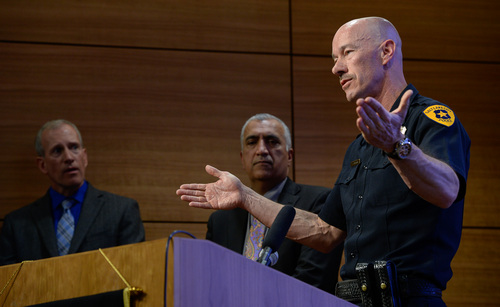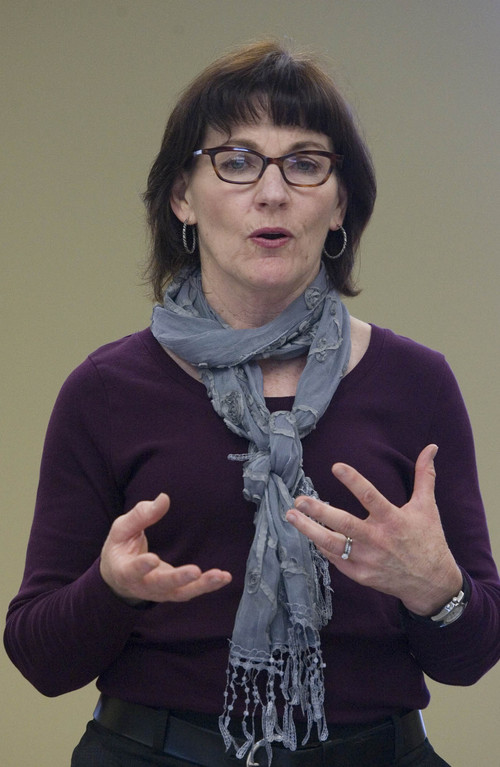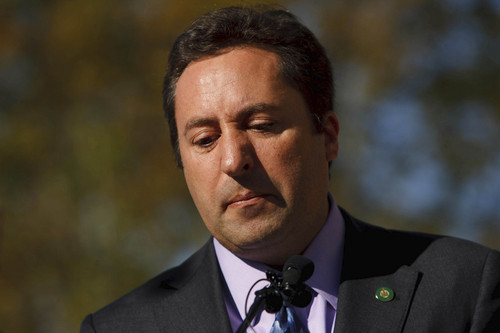This is an archived article that was published on sltrib.com in 2014, and information in the article may be outdated. It is provided only for personal research purposes and may not be reprinted.
Salt Lake City Police Chief Chris Burbank ripped into City Councilman Kyle LaMalfa on Wednesday for impugning detectives who investigate rape allegations — and then he outlined a groundbreaking initiative that would make such inquiries transparent.
Burbank put forward his "Code R Kit Project," which would post online information on 625 rape cases but would protect the identity of victims. It would allow the public to see if forensic rape kits were forwarded to the state crime lab for processing, post the evidence from the rape-kit analysis, and note whether the case was then forwarded to prosecutors and whether charges were filed.
Presently, there are some 625 unprocessed rape kits in evidence at the Salt Lake City Police Department from a total of 788 that were never tested. Of those, 163 were destroyed without being tested. Another 59 were destroyed after tests and adjudication and 154 more were sent to the state lab for processing.
From 2003 to 2011, 1,001 rapes were reported in Salt Lake City.
Burbank said, starting June 1, he will post the oldest cases first at slcpd.com and display information on all 625 cases for which the SLCPD has rape kits. Case numbers will be changed to protect complainants.
"This is unprecedented transparency so you can see how the cases are investigated," the chief said. "You will see the reasons why the evidence is processed or not."
The unveiling of the transparency project came 24 hours after a heated City Council work session in which LaMalfa asked the chief why so many of the rape kits had not been processed.
Burbank took umbrage at the suggestion that his department wasn't investigating rape allegations as vigorously as it should.
"One council member misrepresented that we have people in our office who don't care about victims of crime," the chief said, labeling LaMalfa's comment as "irresponsible."
But later Wednesday, LaMalfa applauded Burbank's new program.
"The fact that all these cases will be re-evaluated is an emotional victory for all the victims that have not had their rape cases move forward," LaMalfa said.
The councilman said he brought the backlog to the attention of the City Council because "other communities have turned their unprocessed rape kits into convictions."
LaMalfa added that he hopes the program outlined by the chief signals a new era of cooperation among the state crime lab, police and prosecutors.
Salt Lake County District Attorney Sim Gill joined Burbank at the announcement to recommend a "multiple disciplinary team" approach to investigations of sex assault. Such an approach was instituted in the county for child sex abuse cases and has been successful, Gill said.
The approach calls for teamwork among investigators, forensic specialists and prosecutors. Rather than each agency acting independently, decisions on bringing cases to court are made collectively, the D.A. explained.
This team approach calls for consistency in training and protocol and outlines best practices. In the end, Gill said, the system ensures that rape allegations in Draper are investigated the same way they are in South Salt Lake.
"This is an opportunity to look at the process and how we can improve it," Gill said, "and make a commitment to a victim-centric approach."
Burbank has criticized the state crime lab for its slow pace of evaluating rape kits and other forensic evidence. He also noted previously that there were some miscommunications with the lab about whether information was being entered into the FBI's national database.
"There is no question the resources at the state lab are inadequate," he said.
On Wednesday, Burbank made his presentation alongside Keith Squires, the Utah public safety commissioner. Squires conceded that the lab overseen by his department needs more resources.
"We always seem to be trying to catch up and keep up," he said.
Nonetheless, a recent $750,000 allocation from the Utah Legislature will help the lab process rape kits more efficiently, he said.
About 88 percent of sex-assault victims are raped by an acquaintance, said Holly Mullen, executive director of the Rape Recovery Center. When investigators identify a victim as uncooperative, it's not helpful, she said
"What I'd like police to understand is the trauma of rape and what that does to a victim's mind."
Mullen said she was encouraged by Burbank's message Wednesday. "The chief listened and he took quick action," she said. "This will help open up a public discussion on sexual violence."







